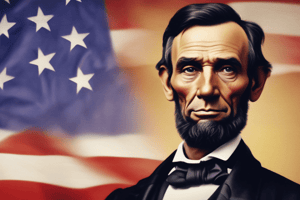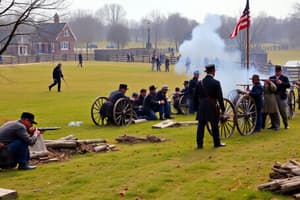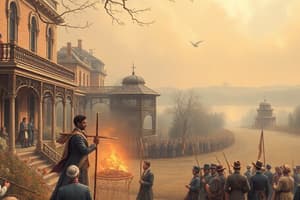Podcast
Questions and Answers
The ______ Proclamation freed slaves in Confederate-held territory.
The ______ Proclamation freed slaves in Confederate-held territory.
Emancipation
Many historians argue that slaves freed themselves by escaping to Union lines and becoming "______"
Many historians argue that slaves freed themselves by escaping to Union lines and becoming "______"
contrabands
The Union's refusal to return escaped slaves pressured Lincoln to issue the ______ Proclamation.
The Union's refusal to return escaped slaves pressured Lincoln to issue the ______ Proclamation.
Emancipation
Lincoln's motive for issuing the Proclamation was to shift the war's focus to ______, hindering potential foreign recognition of the Confederacy.
Lincoln's motive for issuing the Proclamation was to shift the war's focus to ______, hindering potential foreign recognition of the Confederacy.
Britain's dependence on Confederate ______ and its abolitionist stance made recognizing the Confederacy politically hazardous.
Britain's dependence on Confederate ______ and its abolitionist stance made recognizing the Confederacy politically hazardous.
Lincoln is acknowledged for pushing through the Thirteenth ______, formally abolishing slavery in the U.S.
Lincoln is acknowledged for pushing through the Thirteenth ______, formally abolishing slavery in the U.S.
Mathew Brady's photographs of the Civil War revolutionized documentation and perception of ______.
Mathew Brady's photographs of the Civil War revolutionized documentation and perception of ______.
The Civil War promoted a stronger ______ government over individual states.
The Civil War promoted a stronger ______ government over individual states.
Flashcards
Emancipation Proclamation
Emancipation Proclamation
An executive order by Lincoln freeing slaves in Confederate-held areas.
Contrabands
Contrabands
Escaped slaves who joined Union lines during the Civil War.
Thirteenth Amendment
Thirteenth Amendment
A constitutional amendment that permanently abolished slavery in the U.S.
Union Army Recruitment
Union Army Recruitment
Signup and view all the flashcards
British Non-Recognition of Confederacy
British Non-Recognition of Confederacy
Signup and view all the flashcards
Mathew Brady
Mathew Brady
Signup and view all the flashcards
National Identity Shift
National Identity Shift
Signup and view all the flashcards
Stronger Federal Government
Stronger Federal Government
Signup and view all the flashcards
Study Notes
The Civil War and Its Legacy
- The Civil War's impact extends beyond battles and casualties, profoundly shaping the world and individual lives today.
- The Emancipation Proclamation freed slaves in Confederate-held territory, but not those in Union-controlled areas.
- Historians suggest slaves frequently freed themselves by escaping to Union lines, becoming "contrabands."
- The Union's refusal to return escaped slaves pushed Lincoln to issue the Emancipation Proclamation.
- The Emancipation Proclamation significantly increased Union forces, with approximately 180,000 formerly enslaved individuals joining the Union army.
- Lincoln's motive for the Proclamation was to refocus the war on slavery, hindering potential foreign recognition of the Confederacy.
- Britain's reliance on Confederate cotton and abolitionist sentiment challenged recognizing the Confederacy.
- The British decision against recognizing the Confederacy impacted global events, shifting cotton sourcing to Egypt and India.
- Lincoln spearheaded the Thirteenth Amendment, formally abolishing slavery in the U.S.
- Lincoln's dedication to ending the war ensured the abolishment of slavery, preventing a continued slaveholding South.
- The Civil War profoundly altered the national identity of the U.S., marking a pivotal historical turning point.
- The Civil War impacted the development of modern nation-states, influencing Italy and Germany.
- The Civil War's scale and destruction, amplified by new technologies like rifles and machine guns, tragically increased civilian casualties.
- The Civil War redefined American attitudes toward death, with national cemeteries replacing churchyards as final resting places.
- Mathew Brady's Civil War photographs revolutionized war documentation and perception.
- Brady's often-staged images offered a new level of visual realism beyond written battle descriptions.
- The Civil War's aftermath solidified American identity and shifted from an agrarian to an industrial society.
- The Civil War fostered a stronger federal government over individual states.
- The Homestead Act, Morrill Land Grant Act, and Pacific Railway Act reinforced federal influence.
- The Civil War's necessity led to the creation of a national currency and income tax.
- The Union heavily invested in its industrial economy, creating a stark disparity between North and South.
- The Civil War strengthened a federalist vision, contrasting with Thomas Jefferson's vision.
- The Civil War's legacy included a robust federal government, national currency, and a transition to industrialization.
Studying That Suits You
Use AI to generate personalized quizzes and flashcards to suit your learning preferences.




